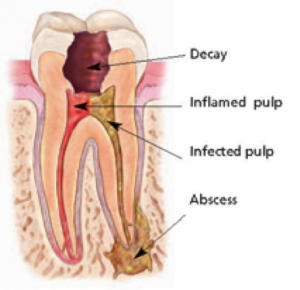To understand a root canal procedure, it helps to know about the anatomy of the tooth. Inside the tooth, under the hard white enamel is a layer called the dentin, is a soft tissue called the pulp. The pulp contains blood vessels, nerves and lymphatics.
In a fully developed tooth, the tooth can survive without the pulp because the tooth continues to be nourished by the tissues surrounding it.
Root canal therapy treats the inside of the tooth. It is necessary when the pulp becomes inflamed or infected. The inflammation or infection can have a variety of causes: breakdown of a filling or crown, a deep cavity, trauma, gum disease, a crack or chip in the tooth, extreme wear and extensive dental work to the tooth. Trauma to a tooth may cause pulp damage even if the tooth has no visible chips or cracks. If pulp inflammation or infection is left untreated, it can cause pain or lead to an abscess.
Symptoms may include:
Pain, sentitivity to heat or cold, tooth discolouration, and swelling
or soreness of the gums surrounding the tooth.
How does Root treatment fix this problem?
During root canal treatment, the inflamed or infected pulp is removed and
the inside of the tooth is cleaned and disinfected, then filled
and sealed with a rubber-like material called gutta-percha. The tooth is
then restored with a crown or filling for protection. Root treated teeth
have an increased risk of fracture without the protection of a crown.
After restoration, the tooth continues to function like any other tooth.
Saving the natural tooth with root canal treatment has many advantages:
1.Efficient chewing
2.Normal biting force and sensation
3.Natural appearance
4.Protects other teeth from excessive wear or strain
5.Prevents drifting or over eruption of neighboring teeth if a tooth is extracted.
Root Canal therapy helps you maintain your natural smile, continue eating the foods you love and limits the need for ongoing dental work. With proper care, most teeth that have had root canal treatment can last as long as other natural teeth and often for a lifetime.


